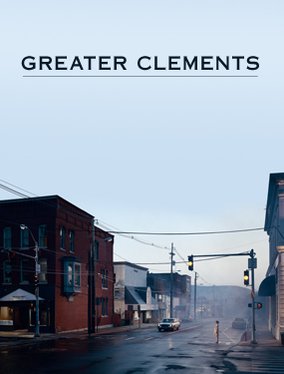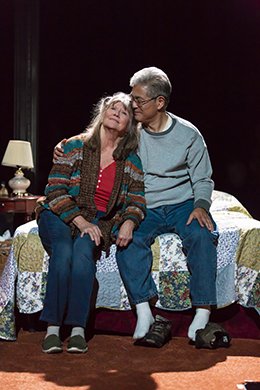

Samuel D. Hunter continues to document the disenfranchised of his home state Idaho in Greater Clements at Lincoln Center’s Mitzi E. Newhouse Theater. As he did in such works as Lewiston/Clarkston, Pocatello, and A Bright New Boise, Hunter feelingly chronicles average Americans coping with tragedy as best they can. (Other recent playwrights to offer similar assessments of our current class struggle include Lynn Nottage with Sweat and David Lindsay-Abaire with Good People.)
Here, the hardy pioneer stock of previous generations is evoked as a tragic echo of faded glory while the present-day citizens of tiny towns in the vast western states reel from the results of corporate greed and upper-class indifference. The plight of Clements, a battered, once thriving mining town parallels that of our polarized country. Rather than deal with restrictions imposed by wealthy vacation homeowners, the working-class Clementines have voted to unincorporate, much as Trumpsters want to burn down the government out of mistrust and fear. Local civic services are terminated, and the lights literally go out in the town.
Caught in the middle of the conflict is hard-working, 65-ish Maggie (the magnificent Judith Ivey), whose family-owned mining museum is about to go under. Her marriage ended after her husband came out as gay, and her psychologically struggling, directionless son Joe (a brilliantly frenetic Edmund Donovan) is back home after spending time in a mental hospital and homeless on the streets of Anchorage, Alaska.
The plot-engine of the play is Maggie’s conflict between staying in dying Clements or chucking it all to join her high-school sweetheart, Billy (tender Ken Narasaki) in another part of Idaho. But Billy has issues of his own including a cancer diagnosis, an alcoholic son, and a withdrawn, suicidal granddaughter (subtly forlorn Haley Sakamoto). We also look into the difficult lives of lonely Wayne (sturdy Andrew Garman), the town’s lone law officer representing the vestiges of authority, and frustrated Olivia (appropriately interfering Nina Hellman), a friend who symbolizes the negative but well-meaning voices aligned against Maggie. When Olivia confronts Maggie over a vital vote (not for President, but the similarities are striking), their searing scene, unflinchingly written by Hunter and played by Ivey and Hellman, recreates our central national dilemma—citizens feeling abandoned by everything they once believed in. Kate MacCluggage provides an intriguing coda in a cameo as a well-off, oblivious weekender.
Despite a melodramatic finish, Hunter delivers a compassionate portrait of ordinary people trapped by huge social and political forces beyond their control. Director Davis McCallum and the exemplary cast carefully balance pathos with sharply objective observation. Dane Lafferty’s massive set with its elevators, girders, and shafts makes Maggie’s home and museum into a mine of buried hopes.
